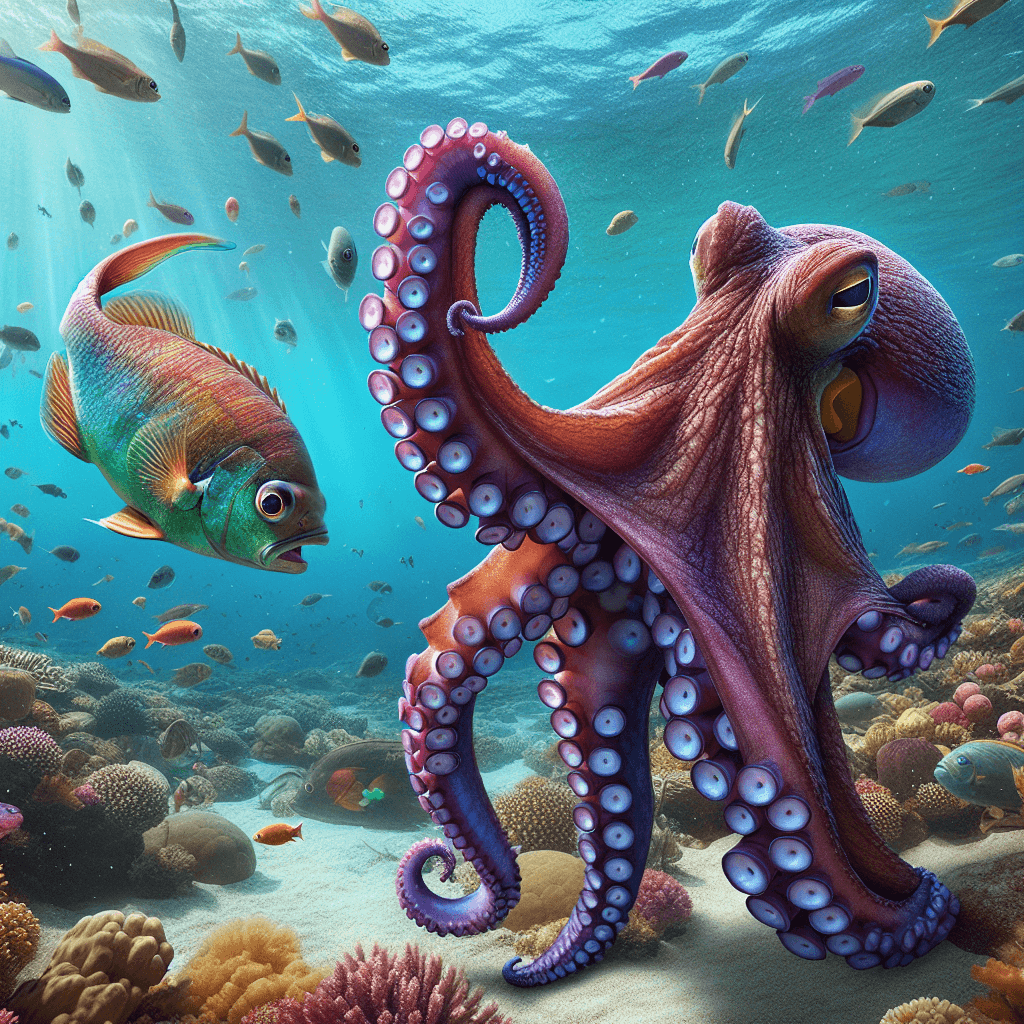Eight Arms and a Bad Attitude
Armed with three hearts, blue blood, and the intelligence to hold a grudge, the ocean’s original alien is not here to make friends.


Too Long; Didn't Read
TLDR: Octopuses are highly intelligent, problem-solving escape artists with complex personalities, and their cunning behavior is often mistaken for a bad attitude.
Ocean Outbursts: Is it True Octopuses Sometimes Punch Fish Seemingly Out of Spite?
Introduction
The ocean depths hide countless wonders, but perhaps one of the most surprising behaviours recently documented involves one of its most intelligent inhabitants: the octopus. We often marvel at their camouflage, problem-solving skills, and alien-like physiology. But what about their social interactions, particularly with other species? Recent observations have brought a peculiar behaviour into the spotlight – octopuses apparently 'punching' fish they are hunting alongside. This raises a fascinating question: Is it true octopuses sometimes lash out at fish seemingly just out of spite? This post dives into the evidence behind these underwater jabs, exploring the context, the potential reasons, and whether 'spite' is truly the right word.
Main Content
What Does an Octopus 'Punch' Actually Look Like?
When scientists talk about an octopus "punching" a fish, they aren't describing a closed fist impact like a human boxer. Instead, it refers to a very specific action: a swift, targeted, "explosive" movement of one octopus arm, directed towards a specific fish. This isn't a gentle nudge; it's a forceful lash. Researchers observing this behaviour noted it's distinct from typical predatory movements or attempts to capture the fish itself. The action is quick, direct, and often seems aimed at displacing or striking the fish partner.
The Hunting Party Context: Collaboration Turns Contentious
This punching behaviour hasn't been observed randomly; it predominantly occurs within a specific, fascinating context: cooperative hunting. Octopuses (specifically Octopus cyanea, the day octopus) in locations like the Red Sea have been observed forming temporary hunting alliances with various fish species (like groupers, goatfish, and moray eels). Different species use different techniques to flush out prey hidden in coral reefs, theoretically increasing success for all involved.
However, it's during these collaborative hunts that the punches happen. An octopus, working alongside its fish partners, will suddenly lash out and strike one of them.
Documenting the Underwater Jab
The behaviour gained significant attention following a 2020 study published in the journal Ecology by Eduardo Sampaio and colleagues. Their team directly observed and filmed multiple instances of octopuses punching fish during these joint hunting ventures in the Red Sea. They documented the context, the frequency, and the apparent lack of immediate benefit for the octopus in some cases, which fueled speculation about the motives.
Why Punch a Partner? Exploring the Motives
While the image of a spiteful octopus is intriguing, scientists propose several, more pragmatic explanations for this behaviour:
- Maintaining Order/Partner Control: The octopus might use the punch to manage the fish's position or behaviour during the hunt, essentially 'herding' its partners to optimize the search for prey or prevent them from scaring potential meals away.
- Preventing Prey Theft (Kleptoparasitism): Fish partners might try to snatch prey discovered or flushed out by the octopus. A swift punch could be a way to deter this theft and secure the meal for itself.
- Displacing Competitors: Even in a collaboration, competition exists. If a fish gets too close to a potential meal the octopus is targeting, a punch might be the quickest way to push the competitor aside. The researchers noted that punches often occurred when the hunting group became chaotic or crowded.
- A Costly Enforcement Mechanism? The researchers themselves suggested that some punches seemed punitive. They observed instances where punching occurred even when there was no immediate competition for food. They theorized it might be a form of 'punishment' to keep partners in line or enforce cooperation, potentially with delayed benefits for the octopus (e.g., more compliant partners in the future).
But is it Really 'Spite'?
This is where we need to be cautious. Attributing human emotions like 'spite' (acting negatively towards another even at a cost to oneself, purely out of malice) to animals is anthropomorphism. While some punches observed by Sampaio's team didn't have an immediately obvious benefit for the octopus, it's hard to definitively rule out functional reasons.
- The benefit might be subtle or delayed.
- We may not fully understand the complex dynamics of these multi-species hunts.
- What looks like spite to us could be a calculated move within the octopus's own cognitive framework to manage the situation effectively according to its goals.
Therefore, while the behaviour looks like punching out of frustration or spite, concluding that's the actual emotional driver is speculative. The functional explanations – managing competition and collaboration – remain the most likely primary drivers, even if some instances appear puzzling.
Conclusion
So, is it true octopuses sometimes punch fish? Yes, the behaviour has been scientifically documented. It involves a swift, forceful arm lash directed at fish, typically during cooperative hunting scenarios. While the exact reasons remain under investigation, the most plausible explanations revolve around managing the collaborative hunt – displacing competitors, preventing prey theft, or controlling partners' positions. The idea that some punches are delivered purely out of 'spite' is an intriguing interpretation based on instances where immediate benefits weren't clear, but it remains speculative and requires caution against anthropomorphism. Ultimately, this behaviour underscores the incredible complexity of octopus intelligence and social interactions, reminding us how much we still have to learn about the intricate lives unfolding beneath the waves.


